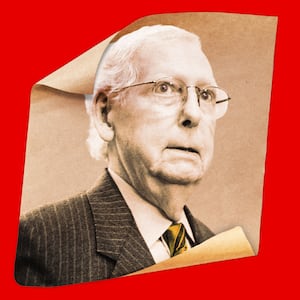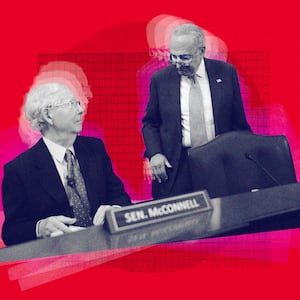Mitch McConnell announced on the Senate floor Wednesday that he will step aside as Senate Republican leader in November, ending a record-breaking run as leader and setting up a potentially bitter struggle to succeed him.
The 82-year old Kentucky Republican, who has served in the U.S. Senate since 1985 and as GOP leader since 2007, said he would continue sprinting toward the finish line, “which is now in sight.”
“One of life’s most underappreciated talents is to know when it’s time to move on to life’s next chapter,” McConnell said on the floor Wednesday. “So I stand before you today ... to say that this will be my last term as Republican leader of the Senate.”
ADVERTISEMENT
“Father Time remains undefeated,” McConnell said. “I am no longer the young man sitting in the back, hoping colleagues would remember my name. It is time for the next generation of leadership.”
McConnell, who was last re-elected in 2020, said he would “finish the job the people of Kentucky hired me to do,” an indication that he plans, at the moment, to serve out his current term, which ends in 2027.
“I still have enough gas left in my tank to thoroughly disappoint my critics,” he quipped.
The longtime leader's decision to step aside marks the end of an era for his party and for the chamber itself. The race to succeed McConnell, which has played out in the shadows for months, will now burst into the spotlight.
The likeliest contenders are three men who have been close to McConnell and his leadership team over the years: his current No. 2 Sen. John Thune (R-SD), his former No. 2 Sen. John Cornyn (R-TX), and his current No. 3 Sen. John Barrasso (R-WY).
The race will be tough, but the eventual winner's greatest challenge will likely be following McConnell's act. Few senators have been more consequential than McConnell, whose ruthless approach to wielding power reshaped the country and government institutions, chiefly the federal judiciary.
But the rise of Donald Trump complicated McConnell's ironclad command of the Senate Republican conference. His Reaganite instincts clashed with the former president's populist movement and its adherents, causing friction even as McConnell carried out key planks of Trump's agenda as president.
Recent years saw McConnell's physical and political strength tested in unprecedented ways. In November 2022, he faced a challenge to his leadership post from Sen. Rick Scott (R-FL) and hard-right members of his conference. While McConnell fended it off, 10 senators nevertheless voted to replace him in a secret ballot.
The Senate GOP's rabble-rousing right flank only increased the intensity and frequency of its McConnell criticism in recent years, as the leader forcefully pushed for increased aid to Ukraine and sought to broker a compromise deal including tougher border enforcement measures and funds for Ukraine and Israel.
Coincidentally or not, McConnell's announcement came at a moment that encapsulated the political pressures he faces now. During a private meeting with President Joe Biden on Tuesday, McConnell pressured Speaker Mike Johnson (R-LA) to take up Senate-approved legislation to provide $95 billion in aid to Ukraine and Israel—though doing so would instantly imperil Johnson's speakership.
Also on Tuesday, at his weekly press conference, McConnell declined to endorse Trump. The two men have not spoken since before the Jan. 6 attack on the Capitol.
Questions about McConnell's future grew more urgent after a series of health crises last year, which included several falls, an extended hospital stay, and two public scares in which the senator was unable to speak during press conferences.
Even after his health appeared to stabilize last fall, McConnell remained visibly frailer around the U.S. Capitol. Sen. Tommy Tuberville (R-AL) said on Wednesday that McConnell's health struggles had an impact on the direction of the conference.
“We've been without a rudder for quite a bit of this last year,” Tuberville told reporters. “Before his injury he had us on track, but ever since his injury we’ve struggled.”
But many GOP senators—from McConnell critics to potential successors—were not inclined to turn the page too quickly just yet.
Sen. J.D. Vance (R-OH), who had been sharply critical of McConnell, said after the leader's announcement that he “obviously had a hell of a tenure.”
“We've had some disagreements over border stuff and Ukraine. So I think it's good for the conference that he's decided to move on, but obviously I wish him the best," Vance said.
“Today,” Thune told reporters, “we just want to reflect on his service and honor him for that.”
Riley Rogerson and Reese Gorman contributed to this report.








